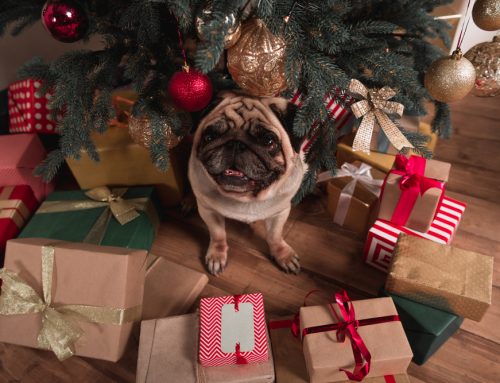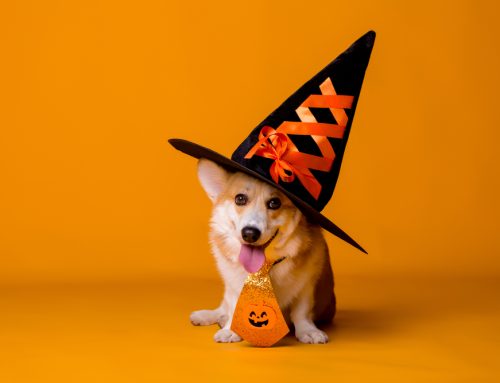You don’t want your pet left out of the holiday gift giving, but how do you choose a safe gift for your furry family member? While numerous toys and treats are on the market, you may be unsure which products are best for your pet. Our American Animal Hospital Association-accredited team at Lebanon Animal Hospital wants to provide guidelines to help you find the perfect gift for your devoted pet.
Gifts for hungry pets
When purchasing edible pet gifts, ensure you read the ingredient label carefully, to ensure you know what your pet will be ingesting. Choose products with a short ingredient list, preferably only one or two items, and ensure the first ingredient is a high-quality protein. Any other ingredients are likely fillers. When evaluating the product’s label, ensure the item is not high in fat. Fatty treats, such as pig ears, can trigger pancreatitis, a painful and potentially deadly disease. Also, ensure the treat was sourced and produced in a reputable country.
Gifts for fashionable pets
Many pet owners like to dress their pets in cute holiday costumes, but if your pet seems stressed when you dress them, this may not be the best idea. If your pet is amenable to dressing up, factors to consider include:
- Go slowly — When introducing your pet to something new, allowing them to gradually acclimate to the situation is always best. Dress your pet in their costume for short periods to start, and gradually increase the duration they spend in the ensemble.
- Avoid restrictive garments — Your pet’s costume shouldn’t restrict their movement, or hinder their eyesight, hearing, or breathing.
Gifts for active pets
If your pet is energetic and always ready to play, you will likely want to find a toy to work off some of that excess energy. But, some popular toys can be dangerous for active pets, including:
- Tennis balls — While tennis balls make great fetch toys, the abrasive felt can damage your pet’s teeth if they are a rigorous chewer. In addition, the ball can be torn apart, resulting in small pieces that could be swallowed, causing a gastrointestinal (GI) obstruction.
- Rope toys — Rope toys are perfect when you are playing tug-of-war, but do not let your pet play with these toys unsupervised. Your pet could ingest a piece of string that becomes unraveled, causing a linear foreign body GI obstruction.
- Feathers — Many wand toys feature feathers, but these wispy objects can become lodged in your pet’s esophagus or stomach.
Gifts for pets who like to chew
This section could also be called gifts for dogs, since all dogs like to chew. Puppies chew to explore their world and alleviate their teething discomfort, and adult dogs chew to help manage anxiety and boredom. However, all dogs are different, with different chewing habits. The chew toy you choose should be determined based on your dog’s chewing characteristics. Most dogs can be classified in one of the following groups:
- The lover — These dogs tend to go easy on their toys, preferring to lick or nibble. They can typically be trusted with a plush toy, and they usually like to carry their toys around in their mouth.
- The in-between — These dogs will shred a plush toy, but typically won’t destroy sturdier toys.
- The destroyer — These dogs are determined chewers who proceed to destroy most toys they receive. Firm rubber toys are best for these dogs.
Once you have determined your dog’s chew classification, you should consider a few other factors as you choose their chew toy, including:
- Size — The toy should be the appropriate size for your pet. They should not be able to swallow the object, but they should be able to get the toy in their mouth.
- Durability — If your dog is classified as a lover, choose plush toys that are durable enough that they can’t easily be torn apart and reveal their inner stuffing, which can cause a gastrointestinal obstruction, if ingested.
- Hardness — The toy should not be too hard, because your pet’s teeth or jaw could be injured. Toys to avoid include bones, hooves, antlers, and hard plastic or nylon toys.
Gifts for overweight pets

You may not want to think about weight control during the holidays, but those few extra pounds can predispose your pet to problematic conditions, such as cancer, diabetes, and arthritis. Taking steps to get your pet to a healthy weight will prolong their life, and improve their quality of life. Gifts to consider include:
- Laser pointer — Many pets can’t resist chasing a red dot through the house. They will get exercise without realizing they are expending energy, because they will be so focused on capturing the red dot.
- Food puzzle toys — Feeding your pet’s meals in a food puzzle toy is a great way to make mealtimes more entertaining, and slows their consumption rate.
Keep these guidelines in mind when searching for the perfect gift for your four-legged friend. If your pet needs to lose a few pounds, contact our Fear Free team at Lebanon Animal Hospital, so we can help them be svelte for the New Year.








Leave A Comment